My friend and fellow author, Robert Kuhn, forwarded this article to me for consideration and publication. After reading it, I found I shared many of the same thoughts as those expressed within the piece. I wondered how many more of us feel this way. Mr. Kuhn broaches the subject in a casual manner – like a discussion between two friends over a cup of coffee. How many of you are with us on this?
By Robert Kuhn
Did Do you have PTSD?
What is it like? How does it feel? What did you do about it?
Yep, I have it and I live with it. It’s not a good feeling and I’ve tried a lot of different ways to avoid and ignore it. HA! Impossible!
As I sit here writing in my basement AO, (“Area of Operation” for the non-veteran readers), I thought I’d begin by describing my recluse/hermit room so that you may learn a little bit about me. Looking around, I wonder if it is a place to escape PTSD or is it a PTSD enabler? Regardless, this is the room where I spend the majority of my time and where I do ALL of my writing. I have the room divided into two sectors. One side of the room is my war memories area and the other side is my sports and other memorabilia area.
In a prominent position in the room, I have my four Vietnam Veteran hats on display sitting on top of my locked gun cabinet. I don’t wear the hats very often, but I sometimes wear the U.S. Army hat when I go to the VA Medical Center for treatment of various service-connected disabilities.
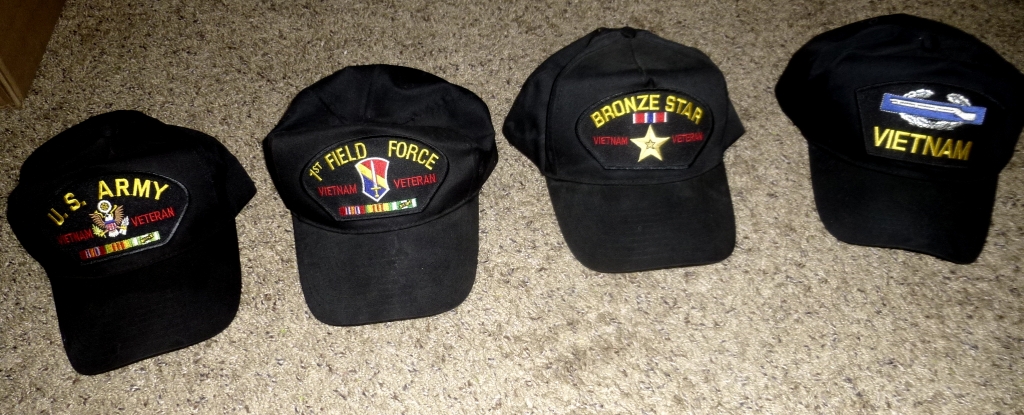
Inside the gun cabinet that the hats sit on are about a dozen rifles, shotguns, and about a half dozen handguns. In addition, there are also my two AR15s. One of the ARs is a heavy barrel rifle that I added a bipod and a scope and zeroed for longer distance shooting if the need ever arrives. The other AR is a lightweight “grab and go” rifle if the need ever arises. Both have fully loaded magazines locked in them but no rounds chambered. Alongside the two ARs, I have three 7-pocket cloth bandoliers of fully loaded 20-round magazines. Just like I carried in Vietnam. And next to that I have a military-style model 1911 .45 caliber handgun with several loaded magazines at the ready. I asked my therapist if that preparedness is a crazy symptom of my PTSD? Am I crazy? I received no comment, no reply, no expressed opinion from him as he quietly continued writing his notes.
On the next wall, I have a shadow box display of my Army ribbons, badges, and awards along with my framed award citations. Draped over the desk chair is a camo poncho liner like the one I used to sleep with in Vietnam, and hanging on a hook in the bookshelves are my dog tags. My old worn-out jungle boots are in the closet. All constant reminders of my Vietnam service. Not that I need a constant reminder, the PTSD works diligently and efficiently at that.
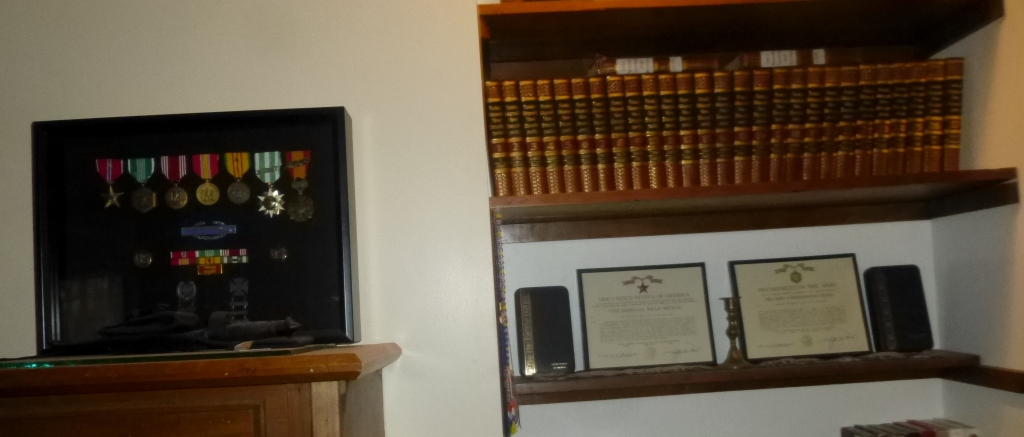
Recently my daughter unexpectedly discovered that I had secretly published my Vietnam memoir, “Rucksack Grunt.” Why did I hide the fact that I wrote a book? PTSD avoidance maybe? After discovering and reading my book she called me and said that she wanted to bring the kids (my grandkids) over to see my Army stuff. I replied, “you know where that is downstairs and you can see it anytime you want.” She replied, “Yeah, but you know we NEVER go downstairs into your room! We want to come over while you are there.”

On the other side of the room, I have a Pittsburgh Steelers plaque hanging on the wall, and on the fireplace mantle, there are a few trophies that my motorcycles have won at the motor shows and car cruises. One of the bikes I built is an Army tribute bike.
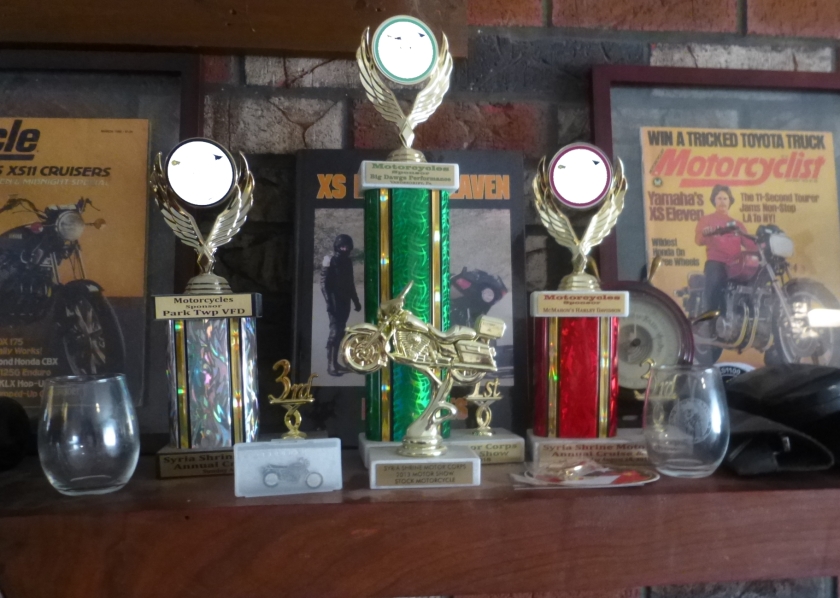
So what causes PTSD to develop in the first place?
I went into the Army at 18 years old. Right there… that should tell you something, Why the hell is the United States military accepting 18-year-old kids in the first place? Their brains aren’t even fully mature and were no way in hell ready to be sent to war. I fully completed my service obligation and my Vietnam tour as a teenager! Is there any wonder that I came home nuts?
In my opinion, a Vietnam tour of duty was an experience of “extremes.” Extremes that ordinary everyday citizens rarely experience. Well, maybe a few do experience a few of them, but not like we did in a never-ending ongoing series of extremes. We were thrown into an extreme humanitarian culture shock by the Vietnamese lifestyle and standard of living or lack of it, which apparently was the Vietnamese “norm” for them. Certainly nothing at all like suburbia Pennsylvania. Then there was the climate shock of overwhelming Jungle heat and humidity and extreme amounts of monsoon rainfall. There was frequent extreme exhaustion. Times of extreme anger and times of extreme loneliness and homesickness, along with times of extreme boredom. Periods of Extreme fear when facing the unknown dangers of going on to the next mission. More times of extreme fear that goes along with coming under small arms rifle fire or under larger incoming explosions. There was the extreme fear for your life and the real possibility that you or your buddies may die, and some did. 58,000+ did.
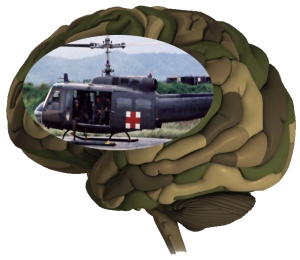
Is there any wonder that some of us came home from the war with our heads all messed up as a result of the cumulative effect of the extremes? In my opinion, being exposed to some of the types of extremes that I described is enough to inadvertently and unknowingly to us, rewire our brains and cause PTSD, just the same as our exposure to agent orange inadvertently and unknowingly to us caused deadly damage to our bodies years later. These are the things that we now live with.
But I put up a good front. I came home and tried to bury all of those thoughts and memories the best I could. Got on with my life, went back to school, got married, got a job, and did all of the things we were supposed to do. Sucked it up… right? But how do you stop the damn dreams and the night sweats and wide-awake insomnia that follows nightly? Easy… a lot of beer for a lot of years. Get numb. Self-medicate. Another better way was to keep myself constantly busy with work, not allowing any idle time for those disturbing intrusive thoughts while avoiding anything that triggered the memories that induced the thoughts.
I pretended for a whole lot of years that those methods were working. I managed to temporarily suppress some of the extreme emotions and memories. But they always eventually resurfaced again and again. And there was no way in hell I was going to admit the problem and seek treatment for the “mental weakness” that I had. I’m a tough Vietnam Vet, right?
I thought that as time passed and I got older, the symptoms would eventually subside, but just the opposite happened, After I retired from work, the PTSD symptoms surprisingly began to escalate, to the point that I felt like I had to seek help or die. It was literally killing me. The anxiety, depression, heart palpitations, blood pressure, sleeplessness, and so forth, was causing a downward spiral in my physical and mental health. I honestly thought I would have a heart attack or stroke.
Decades after the war, I finally sought help from the VA and was quickly officially diagnosed with “moderate” PTSD. Fortunately, I was never suicidal. The psychologists and psychiatrists offered treatment choices of medication, talk therapy, or both. I wasn’t ready to talk, so I chose medication. Well, I found that there was a trade-off with that choice. Yes, it helped to reduce the anxiety, but the accompanying brain fog and lethargy were unpleasant, to say the least. Over time my body has somewhat adjusted to the medication effects. It was really nice to be able to sleep through most of the night for the first time in many years. I found though that the meds were not enough, so a year later I began some intense individual talk therapy. What a trip! That’s a whole ‘nother interesting story that I will write about in a future article. As I said, the meds helped a little bit and so did the talk therapy. The worst of the symptoms have improved a bit, but I honestly can’t say that I believe my PTSD will ever be fully cured. However, even incremental improvements are welcomed! I’ve lived with it and managed it for 50 years and will continue on.
After reading one of the other articles that I wrote, a person close to me offered his opinion regarding my open discussion of PTSD “mental health.” He suggested that I should tone down the talk of being nutso and crazy as I sometimes half-jokingly write. “You don’t want to broadcast to the world about your mental health problems, do you?” Well, I thought about that for a bit and came to the conclusion that YOU, my friend, are actually part of the problem! Just like when we Vets came home 50+ years ago to an unwelcoming society that didn’t want to hear about our war. That is exactly what exacerbated and contributed to the problems that many of us suffer with still today. No, I am not going to tone it down, and no I am not going to hide my PTSD any more than I would try to hide my agent-orange cancer. Think what you will.
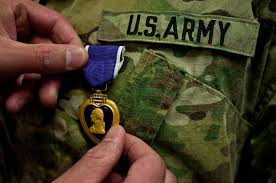
I realize that the Purple Heart recipients are a whole other class of wounded warriors that have my and our entire nation’s most sincere grateful respect, honor, and empathy. Our PTSD war wounds are of a different nature of course. However, it is my hope that someday all disabled veterans may be acknowledged by this nation with the same dignity. Even those of us with the types of delayed wounds that have developed over long periods of time. Until then, personally, I will not tone them down or hide from the stigma. I wear them and think of them as a badge of honor and a tribute to the price that we paid for proudly serving our country.
In closing, I’d be remiss if I didn’t mention that one of the most therapeutic and productive results that I have found in dealing with PTSD is writing. And that is exactly why I am writing this article. It helps me and hopefully reading this will help others too. Surprisingly and thankfully, when I started writing my stories my nightmares finally ceased. I would encourage others with PTSD to write about their war experiences. I can help you with that if you like. Writing helped me probably more than the meds and therapy did.
Always remember; In most cases, PTSD is treatable. No need to suffer unnecessarily.
Thank you for reading, and may God’s Grace be with you all.
Robert Kuhn, author of Rucksack Grunt, A Vietnam Veteran’s memoir.
Co-B, 1st Battalion 22nd Infantry, IFFV.
https://rucksackgrunt.com
<><><>
Thank you for taking the time to read this. Should you have a question or comment about this article, then scroll down to the comment section below to leave your response.
If you want to learn more about the Vietnam War and its Warriors, then subscribe to this blog and get notified by email or your feed reader every time a new story, picture, video and changes occur on this website – the button is located at the top right of this page.
I’ve also created a poll to help identify my website audience – before leaving, can you please click HERE and choose the one item that best describes you. Thank you in advance!



Heard a news report on the radio one day that talked about how rare PTSD is in Israel. The theory was that virtually the entire Israeli population suffers from their wars. So, unlike the U.S., everyone understands what the veterans feel. I don’t know, but maybe some of that PTSD comes from not being able to communicate on an everyday basis with our neighbors and civilian friends about the war. I had a neighbor who was a WW II veteran. He and I discussed the war many times. Simple commo like that.
My war was the Iraq war. Have met a lot of vets with various stages and phases of PTSD. I also practice law and represent folks in employment disputes. So, I get to know some veterans up close in a professional capacity. It *does* seem like a lot of employers over-react to simple symptoms of PTSD. I expect the civilian population as a whole over-reacts to simple symptoms of PTSD.
Great post. Thanks for sharing.
Tom
LikeLiked by 1 person
I was a combat corpsman for 2 and 1/2 tours in the bush during Vietnam. I still see faces and wounds in my dreams.
LikeLike
Interesting! Thanks for posting, Tom!
LikeLike
PTSD is not just limited to just we who served in the military or to police and fire fighters and other first responders. It embraces almost everyone who has had a car accident seen a robbery, been rapped, lived a mother less or father less child, had an abortion. You name it and you can probably have some degree of PTSD. Personally, I am a two tour Vietnam aviator with over 1,300 combat hours, and diagnosed at 70% and anger is my issue. Both my two wives and six children can all relate to my having experienced Dad’s anger. How have I coped? I have written a book, poems, short stories; all are mostly related to Vietnam. Have I found relief? Yes, but only after coming to what one calls a “Jesus moment.” I became a certified warrior and family mentor with PTSD USA out of Houston, TX. The course is faith based on Christianity. Do I still get angary? Yes, but I have learned to recognize certain triggers and how to respond without getting angary. Instead of the usual four letter foul words, try the ultimate four letter word: LOVE.
LikeLiked by 2 people
I find your words accurate and – I care. It was a relief to read how the well-meaning buddy actually was a part of the problem. I have felt that too, but never talked about it. I have been in many hostile situations, and after coming home from dealing with mass fatalities, I went to my doctor for debriefing. Well, that didn’t work out too well – the doctor was shocked and took a sick leave. Why, I had only just begun talking…
Which, of course made the problem worse: there I was, having brought the memories to surface only to find I was alone with them again, but now they were a real terror. So, I spent years alone in my room. I have stuff saved too: a lighter, packs of cigarettes…A vest. I will certainly read your book. And thanks for sharing. God’s grace be with you too.
LikeLiked by 2 people
Wow! I thought he was me for a minute, Every thing is so real, I thought only I felt this way! Thank you so much,
LikeLiked by 1 person
Thank you all for reading my articles and responding so positively with your thoughtful comments and feedback. Your encouragement and support mean a lot to me.
My goal as always is to write something meaningful that you can relate to and may even be helpful.
We as veterans share the common experience of having served our country honorably. As a result, we bear the rewards as well as the consequences of having served.
We also have our own individual stories and experiences. I encourage you to tell your story in your own way. Write it, speak it, sing it, but don’t hide it. Share it!
Thanks again,
Robert Kuhn (AKA Rucksack Grunt)
LikeLiked by 1 person
I agree I have Severe PTSD. I served as a combat corpsman with the marines for 31 months outside the wire(in the bush) and I still see my casualities every night.
LikeLiked by 1 person
Great
LikeLiked by 1 person
I spent my working life helping vets in various capacities, never working directly for the VA, but for both public and private organizations that helped vets. I hear your story loud and clear, it is the story of many if not most of us during that time of war. Thanks for sharing and thanks for your articles.
LikeLiked by 1 person
James Hall SSG Tank Commander TET Offensive 1968. Great article that fits me to a T. Thanks for all your writing.
LikeLiked by 1 person
Excellent!
LikeLiked by 1 person
Brave veteran with a beautifully crafted account of one person’s experience in RVN. Thank you for your bravery in RVN and for a enlightening the current generations about what it means to be a veteran.
LikeLiked by 1 person
I came home 12/71 after serving a six month tour in Vietnam, the rest of my Westpac tour was spent in Okinawa. I was bored doing camp guard at Camp Hansen and when a quota became available for a radio operator in Nam I jumped at the opportunity. I served with Sub Unit One 1st ANGLICO mostly in the Que Son Mountains area, Hoi An/Dien Ban with the ROK Marines. They took careful watch over me because I was their avenue to communicate with any english speaking support. Medivacs, artillery, naval gunfire, air support and such. If I was out of commission they were at a disadvantage. No, they didn’t allow me to “snoop and poop” much outside the wire. Once or twice a month I’d sit on a hilltop with about 20-24 ROK’s and serve as a FO. (Yes there is a guilt factor that I had it “easy” compared to the Hell many endured. Must say some nights did give me the “pucker factor” and scared the hell out of me as it was more difficult to have no one to share feelings with.) That said, I survived though I do bare mental scars.
12/71 Camp Pendleton I realized I’d changed. I went to the CO and he sent me to the Chaplin. Chaplin tells me, as he hands me a bible, “we taught you to hate and kill, you need to love again, read this and you’ll get better”. Sure I felt there is a grain of truth in it but knew my condition was something some bible passages wouldn’t touch. Next requested to go to sickbay. You know, “sick, lame and lazy. Dumb, stupid and crazy. Fall out here.” Doc I says can you take my blood pressure, I’m not right. He responds, “I’m not going to mother you, now get out.” Huh, fine, “can I have your name, rank and serial number so I can write my senator.” He begrudgingly took my pressure and told me to leave. (Almost twenty years later they developed a test for hep-c and found I had it) To say the least I learned quick to shut up and get on with life, self medicating with beer and pot to stay numb.
Got out of Marines 1/73 and did my best to assimilate into civilian life without much luck. Folks just treated me differently and stayed-at arms length. My battle with my undiagnosed hep-c was also making it more difficult to adapt. I’d get “hot-flashes” that started in the middle of my back (liver area) and would pass through my body.” This added to my confusion because as you may recall the media coined a phrase “flashback”. Headlines stated Nam Vet has a flashback and shoots up some people, or Nam Vet has a flashback and commits some atrocity. I then convinced myself, yep that’s me having a flashback, hope I don’t harm myself or anyone else. This made me hide from civilian life more. Took up beekeeping because I knew folks wouldn’t want to hang out and actively avoided connecting with folks.
Used my G.I. bill to get an education and tried to live life with some semblance of normalcy but remained a recluse mostly. Fast forward to early 80’s, I and my wonderful wife and baby daughter moved to Sitka Alaska where luckily I’d attained a job with the BIA at Mt. Edgecumbe, a boarding school for students from small villages without high schools. It was heaven for me because prior to that I’d sub-taught in Flint, Michigan, where most times students saw that day as a vacation. Sick students came to school thinking it was free time. The kids at Edgecumbe were innocent and not jaded. The slightest joke sent them into laughter. Unfortunately the government shut down the school because of the current recession.
Moved north to Palmer and went to work for Anchorage District. I was still struggling with my unknown hep-c, so in 83’ went to the VA requesting my medical records (which I had but wanted to make sure I had all). I was informed that “there had been a fire in D.C. and all my records were burnt. This just solidified my distrust of the VA and drove me further from seeking help as it was another proverbial “straw on the camel’s back.” I’d convinced myself that not only did civilian’s not care but so didn’t the VA. Made me more of the hermit. Yes, I worked, raised three beautiful daughters but shunned interaction with folks as the hep-c worsened with the “flashbacks”.
1991 a test became available to detect hep-c and I was found to have it. Went back to VA and miraculously my records were found. Started receiving counseling, which consisted of, “oh, you look tense today or my you seem more relaxed.” Counselor gave me tons of books with pretty pictures and poetry but no insight how to become better. She also told me she would assign me a rating for my disability (she lied). Finally got to see a person that would really assign me my rating and he stated,”yeah, you have PTSD, but not bad enough. And your hep-c was because I’d done drugs.” Again lost any faith in VA.
Got on with life as best could. Finally a cure for hep-c came out around 2001 and I beat it. Though prior to that they were juicing me with Interferon which was no fun. Imagine it hurt to walk because of the pain it caused.Somewhere around 2019 I met an Afghan Vet and shared my trials with him about the lack of help from VA. He instantly called the Vietnam Veterans of America and boom they helped with counseling and a 60% rating of disability. Finally had help after fifty years. It was never about the compensation it was me needing help and reassurance I wasn’t totally nuts.
I like you, Robert, found solace alone transforming our five acres into something beautiful. Dad shared a story about a man that drove fancy cars. Dad asked him why he had expensive , fancy cars but lived in a dilapidated home. The man responded, “you see me when I’m driving but not when I’m living.” I took the antithesis of this and spent energies on landscaping and driving VW Bugs that I’d rebuild (have two roadworthy and eleven in my boneyard for parts and future projects).
I’ve learned I’ll never be whole but rue the life that could have been. Recently lost my middle daughter to cancer and I am pursuing more counseling with the VA with a different counselor. My anger is palpable and at the surface because I believe I passed Agent Orange on to my daughters. Eldest has Grave Disease, middle died from ovarian cancer and the youngest was born with hip dysplasia. If I was a female Nam Vet they would have their maladies covered but not so with male Nam Vets, go figure. I guarantee to folks when Nam Vets pass the government will admit the error. So yes, I’m angry and jumpy as hell from PTSD. I do a fine rendition of Fred Flintstone paddling feet in midair. Funny for others to observe but hell on my heart. It’s an explosion of adrenaline.
LikeLiked by 2 people
That explains a lot of what I been feeling. My wife of 53 years understands me, but she some times we laugh about it and go on. The one and one counseling helped me a lot and the group sessions helped a lot also. Thank’s Frank
LikeLiked by 1 person
very good I was 1966 to 1968 but never went over
LikeLiked by 1 person
Well written and as you stated part of the problem is people telling us to get over it. Keep on writing
LikeLiked by 1 person
Thank you for your service to our country and thank you for sharing your experience with PTSD!!! Please keep writing!!! Please continue to take of yourself!!!!
LikeLiked by 1 person
I found the best “talk” treatment came when I wrote my story as a song as part of Operation Song. As an aside I fully expect the current government to try to take guns away from any vet who has verified symptoms of PTSD
LikeLiked by 1 person
I got home in 69. I was married with a kid on the way (conceived on R&R in Hawaii). It took me over 20 yrs. to be convinced that I suffered from PTSD. I’ve been on the mend ever since, assume it will be with me until I die. Soldier on.
LikeLiked by 1 person
I like it because I have written the same and came to the same collusion after writing a memoir. of my life before, during and after Nam. Writing about your experience is the best treatment for PTSD. I found that it puts it all into your conscious mind where I could deal with it. I was a grunt with the 5th Marines, Delta, 1/5, 1st MarDiv from 10-66 to 6-5-67 and as I like to say today, “I survived the Que Son’s”, [4-21-67 to 6-5 67] after being wounded twice and receiving the Silver Star for my actions the day and night of May 12, 1967 during the Union operations.
LikeLiked by 2 people
Wonderful article!
I can relate to most of his thoughts.
Also enjoy many other articles on your website.
LikeLiked by 1 person
Robert, you are not the first person I have heard say that talking an writing about you experiences really helps reduce the impact of the PTSD. I never had the exposure you did, I guess I was fortunate to be in the Pacific in the Submarine Service at the same time you were serving in the jungles.
I had an uncle who survived Pearl Harbor and never, ever talked about his experiences in the battle and following through the rest of the war, except one tidbit he told my mother, his sister. And that was body recovery from December 7 to December 25, cutting holes in a ship. He did die at 65 of heart failure one month to the day after retirement, and I wonder if his PTSD led to that.
LikeLiked by 1 person
Storing your magazines loaded lessens the tension of the springs over time leading to failures to load. Store with mags empty but with ammo at hand. Just so you know.
LikeLiked by 1 person
The 1st Bn of the 22nd Infantry must be in the Pleiku area 1st or 2nd Brigade of the 4th ID ? The gun stuff in your bunker to me is a problem, but in some ways I understand it. I too am an infantry grunt of the 3rd Brigade of the 4th ID (A Co. 3/22 Inf.) The journey you had been on is certainly shared by many of us, the denial that PTSD had any effect on me was huge. Yes the return home was traumatic the summer of 1968 after 2 tours, and I think played an equal part in my dysfunctional emotions. I too became a workaholic knowing the only way that I could ever sleep was to be totally exhausted and even then the brains vision of the past never shuts down.
Many many decades past, and when I was less involved in my real estate development business the PTSD increased in its effects on my inner emotions. Three divorces, several long-term relationships later her I am still single after 40+ years, and yes I am better at dealing with it than before. But this will never go away, and it will always be there to drag me down and at 78 that is not comforting to know. Add to that the companion to PTSD is lessor known but in some of us equal in dysfunction “The Moral Injury”, mine comes from the Battle of Soui Tre March 21, 1967 defending a firebase from an overwhelming human wave attack by a force over 10 times our size where we repelled the onslaught using over 30 105 Beehive rounds. The first time they were ever used in combat. A weapon of mass destruction that left more than 400 of the 881 enemy dead shredded and nailed to trees. The impact on most of us was complete Schock & Horror but survival was our main mission. As a Platoon Sargeant at 21, I had 4 years of service when I got to Vietnam, and everyone in my platoon was drafted and 19-21 years old. Read the Book “Duel with the Dragon” from author Bill Comeau and published by “Deeds Publishing”, that battle propelled the career of a soon to be retired WWII hero, LTC named John Vessey to 4 stars ten years later and Chairman of the JCS in 1983, and at retirement in 1986 the Chair of the POW-MIA Commission for 14 years. The battle with PTSD Continues
Michael Doolittle
Chairman, Hawai’i County Veterans Advisory Committee
http://www.hawaiicounty.gov/boards-and-commissions
Chairman, Hawai’i Island Veterans Memorial Inc.
http://www.hawaiiislandveterans.org
Mystic Palms Plantation
P.O.Box 342
Hakalau, Hawaii 96710
206 719 8916
LikeLiked by 2 people
Very good article and I feel you’re right on. I to am a former 11B with a Purple Heart, due to ambush on Christmas Eve “68. A few months later I was shot across the nose though like a scratch on the skin, but pretty close. Those who’ve never served or caught in a battle have no ideal what war does a young man. It angers me when those who never served make light of war.
LikeLiked by 1 person
For those of us that were out in the boonies for months at a time, there was no “next mission “. 3rd/506th Currahee Battalion, 101st Airborne Division. RVN/Cambodia
1969-70
LikeLiked by 1 person
Authentic!
LikeLiked by 1 person
http://www.smybooks.com
LikeLiked by 1 person
Ditto. I still walk the walk!
LikeLiked by 1 person